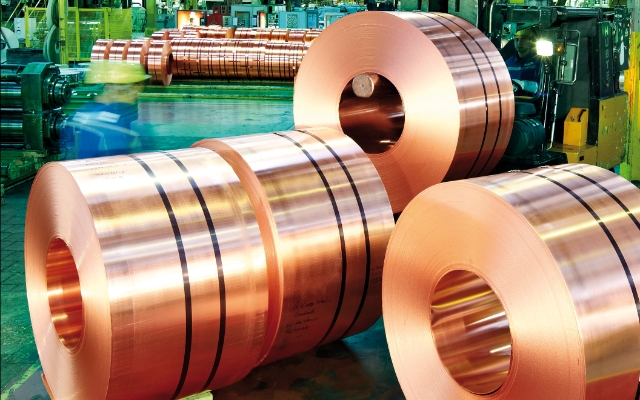Enhancing Your Cooking Area with Costs Copper Products: Tips and Ideal Practices
Enhancing Your Cooking Area with Costs Copper Products: Tips and Ideal Practices
Blog Article
Exactly How Copper Products Contribute to Lasting Practices in Numerous Sectors
In sustainable energy systems, for example, copper improves the functionality of solar and wind modern technologies, while its application in building lessens waste through longevity. As markets seek to embrace even more sustainable practices, the duty of copper could confirm pivotal in accomplishing ecological objectives.
Copper in Renewable Resource
Copper plays a crucial duty in the improvement of renewable resource modern technologies, offering as an essential conductor in different applications. Its exceptional electric conductivity and resistance to deterioration make it a suitable material for electric circuitry, which is essential in photovoltaic panels, wind turbines, and energy storage systems. In solar photovoltaic systems, copper is made use of in the interconnections and circuitry, allowing effective power conversion from sunshine to electrical energy.
In wind energy, copper is indispensable to the generators and transformers that convert kinetic power into electrical energy, making certain optimal efficiency and dependability. The need for electrical vehicles (EVs) is raising, with copper being a key part in batteries, motors, and billing framework. The change to EVs significantly boosts the need for copper, as these cars normally utilize 4 times a lot more copper than traditional internal burning engine vehicles.
As the world looks for to mitigate climate adjustment and transition to lasting power sources, copper's role becomes progressively essential. The product not only improves the performance and toughness of sustainable power systems but additionally sustains the wider goal of minimizing greenhouse gas emissions and promoting a lasting future.
Eco-Friendly Building And Construction Materials
In the last few years, there has been a remarkable shift towards the adoption of eco-friendly building and construction materials in response to expanding environmental concerns. This change is motivated by the demand for lasting choices that decrease eco-friendly impacts while keeping architectural stability and aesthetic allure.
Copper, known for its toughness and recyclability, has actually become a crucial player in this industry. It can be made use of in roof, plumbing, and electric systems, adding to energy effectiveness and reducing waste. Copper's longevity indicates less replacements over time, more enhancing its sustainability account.
Furthermore, materials such as bamboo, recovered timber, and recycled steel are obtaining appeal. These alternatives not only supply lowered environmental effect however also promote resource conservation. As constructing codes increasingly highlight sustainability, designers and home builders are integrating these products right into their projects, cultivating technology in design.
The enhancing fostering of eco-friendly building and construction materials reflects a more comprehensive commitment to sustainability in the built atmosphere. By focusing on these products, the building market can dramatically minimize its carbon footprint, align with regulative requirements, and sustain a healthier ecological community for future generations. This fad marks a critical action in the direction of an extra sustainable future in building.
Copper's Function in Health care
Current researches have highlighted the substantial duty of copper in healthcare settings, particularly because of its antimicrobial residential or commercial properties. Copper surface areas have been revealed to minimize the existence of virus, consisting of bacteria and infections, by up to 99.9% within a brief period. This remarkable effectiveness makes copper a vital product for high-touch surfaces in hospitals, such as doorknobs, bed rails, and IV posts, thus adding to improved infection control steps.
Along with its direct antimicrobial impacts, copper also contributes in the wider context of medical facility sustainability (Copper Products). By incorporating copper into clinical equipment and home furnishings, health care centers can lower the occurrence of healthcare-associated infections (HAIs), which not only enhances client results however also lowers the expenses connected with extended medical facility keeps and additional therapies
Moreover, copper's sturdiness and recyclability straighten with lasting practices, permitting for accountable resource monitoring. As medical care systems increasingly prioritize both patient safety and security and environmental stewardship, the combination of copper products is becoming much more prevalent. This double advantage underscores copper's essential payment to a healthier, safer, and a lot more sustainable health care setting.
Sustainability in Transportation

Furthermore, copper's toughness and corrosion resistance add to the longevity of transportation infrastructure (Copper Products). In rail systems, for circumstances, copper parts boost the dependability and efficiency of signaling and power systems, essential for decreasing delays and energy intake. Additionally, copper's function in renewable resource systems, such as solar and wind, supports lasting transportation solutions by supplying tidy energy for electrical transit alternatives
Investments in copper modern technology not only foster sustainability yet likewise stimulate economic growth and job production in green sectors. As sectors make every effort to satisfy stringent ecological laws, the application of copper items in transportation arises as a pivotal technique in attaining sustainability goals and advertising a cleaner, more effective future.
Copper and Round Economy
As the globe increasingly embraces sustainability, the duty of copper in the round economic situation comes to be ever before much more considerable. Copper's inherent residential properties-- such as address its resilience, conductivity, and recyclability-- setting it as a key material in a resource-efficient economic climate. The round economic situation intends to decrease waste and make best use of source use through recycling and reusing products, and copper excels in this regard.
The steel can be recycled forever without loss of high quality, making it a perfect candidate for sustainable methods across different markets, including building and construction, electronic devices, and renewable energy. By recouping and recycling copper from end-of-life products, industries can substantially minimize the demand for virgin materials, therefore reducing ecological impacts connected with mining and handling.
Furthermore, the combination of copper right into circular economy frameworks not just conserves sources however additionally promotes innovation. Services that prioritize copper reusing add to an extra sustainable supply chain, boosting their competitiveness while aligning with regulative needs and customer preferences for eco liable items.
Conclusion
In final thought, copper products significantly add to sustainable practices across several industries. Their necessary role in boosting renewable resource innovations, advertising environment-friendly building and construction materials, sustaining infection control in medical care, facilitating lasting wikipedia reference transportation, and personifying the concepts of a round economic climate highlights the convenience and importance of copper. By incorporating copper right into numerous applications, industries can accomplish better efficiency, reduce ecological impact, and align with global sustainability goals, inevitably fostering a more lasting future.

Copper's outstanding conductivity makes it a favored material in electric lorry (EV) systems, boosting power effectiveness and performance. Additionally, copper's function in renewable energy systems, such as solar and wind, sustains sustainable transportation remedies by offering clean power for electrical transit choices.
Their necessary role in improving sustainable power technologies, advertising environment-friendly construction products, sustaining infection control in healthcare, facilitating sustainable transport, and embodying the principles of a circular economic climate highlights the adaptability and importance of copper.
Report this page